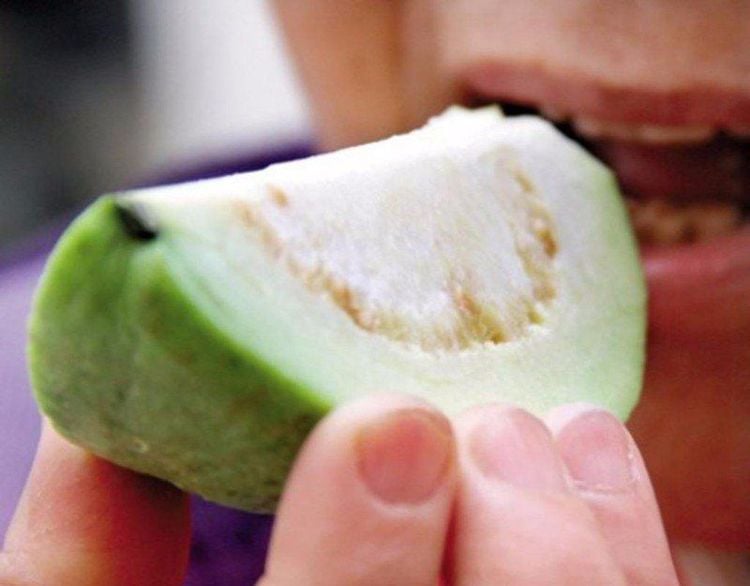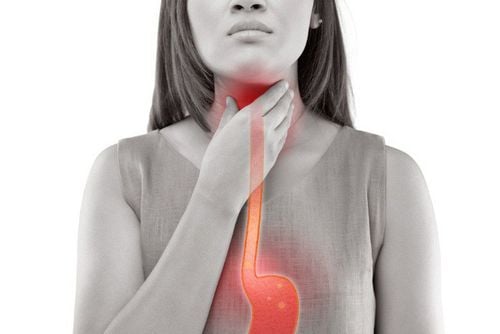The peel and seeds of guava contain many natural nutrients such as vitamin C, vitamin A, magnesium, iron, potassium, phosphorus, calcium, thiamine, etc., which have anti-cancer, anti-inflammatory effects, support the digestive system, improve diabetes, and skin issues. Therefore, if you eat guava without the peel and seeds, it will reduce the nutritional value of this fruit.
1. Health benefits of guava peel and seeds
Many people have the habit of peeling guava and removing the seeds, thinking it is not good for health. Currently, questions like "Should you peel guava?" or "Should you eat guava seeds?" are still common concerns.
According to nutrition experts, guava peel and seeds have similar nutrients to the flesh. Eating guava with the peel and seeds can provide practical benefits such as:
- Preventing cardiovascular diseases: Guava contains a large amount of potassium and antioxidants, which are effective in reducing blood pressure. Therefore, eating guava with the peel and seeds is very useful for preventing and protecting against cardiovascular diseases.
- Treating constipation: Eating guava can cause constipation only if you eat unripe and green guava. On the contrary, eating ripe guava with the peel and seeds can effectively solve constipation due to its high fiber content, which helps prevent stomach acid and supports better digestion. In particular, guava seeds have a laxative effect and clean the intestines, so the answer to "Should you eat guava seeds?" is yes.
- Preventing cancer: Guava peel and seeds help prevent and eliminate the development and formation of dangerous cancer cells. Additionally, the high lycopene content in guava helps the body cope with prostate and breast cancer.
- Controlling cholesterol: Eating guava can help reduce cholesterol because its seeds are rich in fiber, which prevents bile absorption, thereby controlling the absorption of unsaturated fats in the body.
- Treating high blood pressure: Guava, including the peel, flesh, and seeds, is rich in fiber and contains natural hypoglycemic substances. These substances help reduce blood cholesterol and lower blood pressure. Therefore, people at risk of high blood pressure and cardiovascular diseases should eat guava more often to improve their condition.
- Healing wounds: Guava contains a lot of vitamin C, carotenoids, and potassium, which can heal wounds in cases of stomach ulcers. You can also use fresh guava or guava decoction to apply to scratched skin to help heal wounds quickly and safely.
- Skin care: Guava contains astringent substances that can balance skin structure. Additionally, vitamin A and vitamin C in guava act as antioxidants, helping to keep the skin healthy and minimize wrinkles and signs of aging.
- Weight loss: Guava is rich in fiber, vitamins, and protein, which can effectively support weight loss. You can eat guava instead of snacks if you feel hungry. Moreover, guava is low in carbohydrates and cholesterol-free, giving you a feeling of fullness to limit snacking during weight loss.
- Preventing and treating Scurvy: Scurvy is a disease caused by a lack of vitamin C. Guava contains a lot of vitamin C, so eating guava regularly will provide the necessary amount of vitamin C for the body, thereby minimizing the risk of Scurvy.
With the benefits that guava peel and seeds bring, the answer to "Should you eat guava peel and seeds?" is yes. However, make sure to wash them thoroughly and eat them in moderation.

2. Notes when eating guava
Eating guava properly will bring many benefits to cardiovascular health, enhance brain function, improve oral health, support thyroid function, and boost the immune system. However, to maximize the benefits and avoid harm to health, you need to note the following basic points when eating guava:
- Do not eat unripe and green guava: Guava only provides health benefits when ripe. Avoid eating unripe or green guava because the tannins in it can cause digestive imbalance leading to constipation.
- Chew guava seeds thoroughly before swallowing: Although guava seeds are rich in fiber and can prevent bile absorption, reduce cholesterol, and control the absorption of unsaturated fats, not chewing them thoroughly can affect digestion and pose a health risk.
- Do not eat too much guava at once.
- Guava, especially guava leaves, helps reduce blood glucose. However, people with diabetes should not eat guava peel as it can affect blood sugar levels.
In summary, guava peel and seeds contain many natural nutrients that have anti-cancer, anti-inflammatory effects, support the digestive system, improve diabetes, and skin issues. Therefore, eating guava without the peel and seeds will reduce its nutritional value.
Please dial HOTLINE for more information or register for an appointment HERE. Download MyVinmec app to make appointments faster and to manage your bookings easily.













